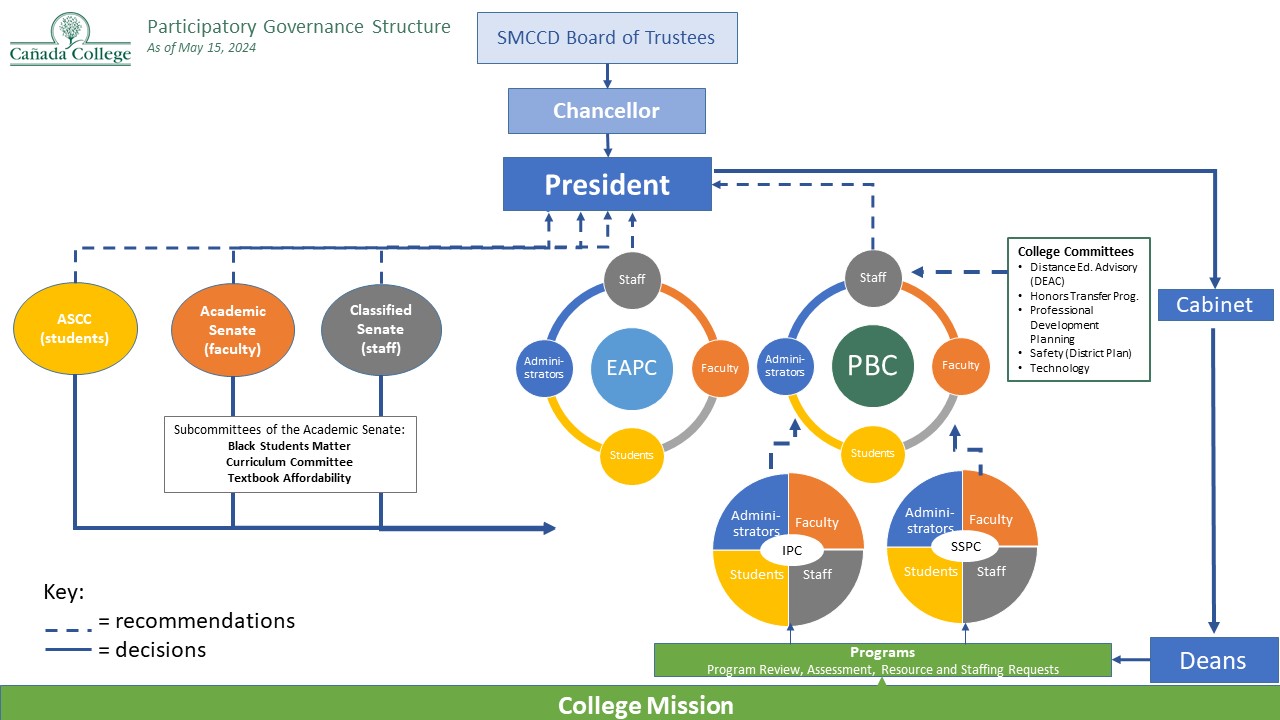Decision-Making Process
Revised by PBC on May 15, 2024
The decision-making process at Cañada College allows each of the College's primary constituent bodies to participate in making recommendations to the College President. These bodies include:
The leadership of of these constituent groups appoint representatives to the following participatory governance groups where they collaborate with administrators in making recommendations to the College President and ensuring that the College adheres to its policies and procedures:
- Equity and Antiracism Planning Council (EAPC)
- Instructional Planning Council (IPC)
- Planning & Budgeting Council (PBC)
- Student Services Planning Council (SSPC)
The following organizational chart outlines their relationship, as well as the committees that report to them, in the decision-making process:

The three Senates, Planning and Budgeting Council (PBC), as well as the Equity and Antiracism Planning Council (EAPC), make direct recommendations to the President.
Recommendations from the EAPC or PBC are subject to approval by the College President. If the President does not accept the recommendation of the EAPC or PBC, the President or designee will return to the EAPC/PBC immediately following their decision and explain why the recommendation will not be implemented or forwarded to the Board of Trustees at said time. A written explanation of the decision will be provided. The approved recommendation(s) of the EAPC/PBC will be acted on or included in materials presented to the Board of Trustees, as the items are available.
The College's Decision-Making Philosophy
The following philosophy applies to participatory governance, planning, program review, and budgeting:
- To base decisions on data.
- To effectively integrate program review, planning, and budget.
- To encourage widespread institutional dialog.
- To base the participatory decision-making process on cooperation, trust, and shared values rather than confrontation.
- To focus on issues that are institutional in nature and which affect the College as a whole.
- To reach solutions that are made better through the expertise of the participants and made more acceptable through the participatory process.
- To foster a climate of mutual trust, creative conflict resolution, and positive communication skills.
- To communicate regularly and clearly with those stakeholders directly affected by decisions.
- To effectively use time and resources by streamlining the processes to avoid duplication of effort.
- To identify purpose, function, membership, and reporting relationships for each committee or work group.
- To maintain reasonable balance and continuity of representation within each participatory governance group.
- To expect representatives on committees to be familiar with committee functions, to be responsible for attendance, and to regularly consult and communicate with constituents.
- The participatory governance process will be reviewed regularly by the PBC.
- To consider equity as reflected in the College Integrated Plan.
